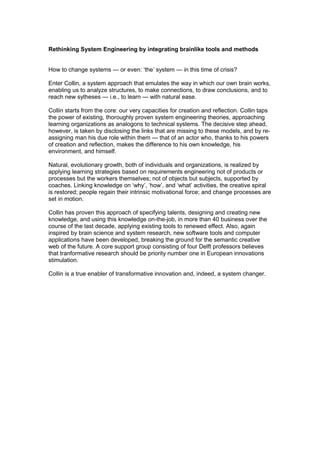Rethinking system engineering
•Download as DOC, PDF•
0 likes•247 views
Collin is a new system approach that emulates the human brain to analyze structures, make connections, draw conclusions, and learn with ease. It focuses on human capacities for creation and reflection, treats learning organizations analogously to technical systems, and reassigns humans' role as creative actors. By applying learning strategies based on requirements engineering for workers, knowledge, coaching, and on-the-job use, Collin enables natural, evolutionary growth for individuals and organizations and sets change processes in motion. Collin has proven effective in over 40 businesses over the past decade and inspired new software and applications, showing potential as a transformative innovation and system changer.
Report
Share
Report
Share

Recommended
Recommended
More Related Content
Similar to Rethinking system engineering
Similar to Rethinking system engineering (20)
Harnessing creativity-and-innovation-in-the-workplace

Harnessing creativity-and-innovation-in-the-workplace
Lessons learned from contrasting Design Thinking and Agile Project Management...

Lessons learned from contrasting Design Thinking and Agile Project Management...
Schilling 2017 chapter two ( Sources of innovation )

Schilling 2017 chapter two ( Sources of innovation )
Designing and using group software through patterns

Designing and using group software through patterns
Open practice across sectors JISC innovating Learning Online conference 2011

Open practice across sectors JISC innovating Learning Online conference 2011
Rethinking system engineering
- 1. Rethinking System Engineering by integrating brainlike tools and methods How to change systems — or even: ‘the’ system — in this time of crisis? Enter Collin, a system approach that emulates the way in which our own brain works, enabling us to analyze structures, to make connections, to draw conclusions, and to reach new sytheses — i.e., to learn — with natural ease. Collin starts from the core: our very capacities for creation and reflection. Collin taps the power of existing, thoroughly proven system engineering theories, approaching learning organizations as analogons to technical systems. The decisive step ahead, however, is taken by disclosing the links that are missing to these models, and by re- assigning man his due role within them — that of an actor who, thanks to his powers of creation and reflection, makes the difference to his own knowledge, his environment, and himself. Natural, evolutionary growth, both of individuals and organizations, is realized by applying learning strategies based on requirements engineering not of products or processes but the workers themselves; not of objects but subjects, supported by coaches. Linking knowledge on ‘why’, ‘how’, and ‘what’ activities, the creative spiral is restored; people regain their intrinsic motivational force; and change processes are set in motion. Collin has proven this approach of specifying talents, designing and creating new knowledge, and using this knowledge on-the-job, in more than 40 business over the course of the last decade, applying existing tools to renewed effect. Also, again inspired by brain science and system research, new software tools and computer applications have been developed, breaking the ground for the semantic creative web of the future. A core support group consisting of four Delft professors believes that tranformative research should be priority number one in European innovations stimulation. Collin is a true enabler of transformative innovation and, indeed, a system changer.
